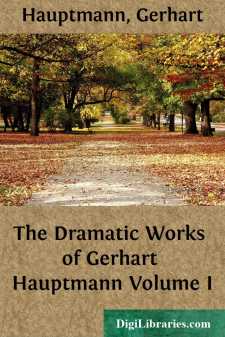Categories
- Antiques & Collectibles 13
- Architecture 36
- Art 48
- Bibles 22
- Biography & Autobiography 813
- Body, Mind & Spirit 142
- Business & Economics 28
- Children's Books 15
- Children's Fiction 12
- Computers 4
- Cooking 94
- Crafts & Hobbies 4
- Drama 346
- Education 46
- Family & Relationships 57
- Fiction 11828
- Games 19
- Gardening 17
- Health & Fitness 34
- History 1377
- House & Home 1
- Humor 147
- Juvenile Fiction 1873
- Juvenile Nonfiction 202
- Language Arts & Disciplines 88
- Law 16
- Literary Collections 686
- Literary Criticism 179
- Mathematics 13
- Medical 41
- Music 40
- Nature 179
- Non-Classifiable 1768
- Performing Arts 7
- Periodicals 1453
- Philosophy 64
- Photography 2
- Poetry 896
- Political Science 203
- Psychology 42
- Reference 154
- Religion 513
- Science 126
- Self-Help 84
- Social Science 81
- Sports & Recreation 34
- Study Aids 3
- Technology & Engineering 59
- Transportation 23
- Travel 463
- True Crime 29
Gerhart Hauptmann
Gerhart Hauptmann (1862–1946) was a German dramatist and novelist, recognized as one of the most influential figures in German Naturalism. He gained widespread acclaim for his play "The Weavers" (1892), which depicted the struggles of Silesian weavers against industrial exploitation. Hauptmann won the Nobel Prize in Literature in 1912 for his contributions to drama, particularly for works such as "Before Sunrise" and "The Sunken Bell." His writings often explored themes of social injustice and human suffering, making him a key figure in early 20th-century European literature.
Author's Books:
Sort by:
INTRODUCTION The first volume of the present edition of Hauptmann's Dramatic Works is identical in content with the corresponding volume of the German edition. In the second volume The Rats has been substituted for two early prose tales which lie outside of the scope of our undertaking. Hence these two volumes include that entire group of dramas which Hauptmann himself specifically calls social....
more...
INTRODUCTION I Gerhart Hauptmann, the most distinguished of modern German dramatists, was born in the Silesian village of Obersalzbrunn on November 15, 1862. By descent he springs immediately from the common people of his native province to whose life he has so often given the graveness of tragedy and the permanence of literature. His grandfather, Ehrenfried, felt in his own person the bitter fate of...
more...
The German fast mail steamer, Roland, one of the older vessels of the North German Steamship Company, plying between Bremen and New York, left Bremen on the twenty-third of January, 1892. It had been built in English yards with none of those profuse, gorgeous gold decorations in a riotous rococo style which are so unpleasant in the saloons and cabins of ships more recently built in German yards. The...
more...




